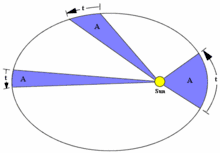orbit
See also: Orbit
English

Diagram of a planet's orbit, illustrating Kepler's second law.
Pronunciation
Audio (US) (file) - Rhymes: -ɔː(r)bɪt
Noun
orbit (countable and uncountable, plural orbits)
- A circular or elliptical path of one object around another object, particularly in astronomy and space travel.
- The Moon's orbit around the Earth takes nearly one month to complete.
- A sphere of influence; an area of control.
- In the post WWII era, several eastern European countries came into the orbit of the Soviet Union.
- The course of one's usual progression, or the extent of one's typical range.
- The convenience store was a heavily travelled point in her daily orbit, as she purchased both cigarettes and lottery tickets there.
- (anatomy) The bony cavity containing the eyeball; the eye socket.
- (physics) A mathematical function that describes the wave-like behavior of an electron in an atom; area of the highest probability of electron´s occurrence around the atom's nucleus.
- (mathematics) A collection of points related by the evolution function of a dynamical system.
- (geometry, group theory) The subset of elements of a set X to which a given element can be moved by members of a specified group of transformations that act on X.
- (informal) A state of increased excitement, activity, or anger.
- Dad went into orbit when I told him that I'd crashed the car.
- 2017 September 18, McGarry, Andrew, “AFL finals week two: The heroes and villains from the elimination semi-finals”, in ABC News, archived from the original on 2 October 2018:
- Given a veritable Pagan's Paddock by the Cats to work in on Friday night, Danger booted two goals in the first seven minutes to send Geelong fans into orbit.
Hyponyms
- bound orbit
- halo orbit
- unbound orbit
Derived terms
- orbital
- orbitational
- orbiter
- three-stage-to-orbit
- two-stage-to-orbit
Translations
path of one object around another
|
|
sphere of influence
eye socket — see eye socket
Verb
orbit (third-person singular simple present orbits, present participle orbiting, simple past and past participle orbited)
Synonyms
- (move around the general vicinity of): circumambulate, tag along
- (place an object into an orbit): launch
Antonyms
Translations
circle another object
|
move around the general vicinity of
Anagrams
This article is issued from
Wiktionary.
The text is licensed under Creative
Commons - Attribution - Sharealike.
Additional terms may apply for the media files.